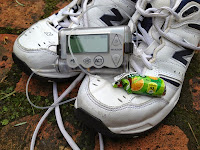If you've read our blog before (congratulations on your uncommon stick-ability) you may remember that we began writing about my diabetes as a family as a result of an unusually nasty hypo. One which made me question whether I was quite as competent at managing my diabetes as I liked to think I was. Posts from others in the household have dwindled rather, and you've ended up stuck with me. Sorry about that. But I look back over the past few years and realise that I have been on a full-on misty-eyed X-Factor-Strictly-Voice-finallist 'journey'.
I was reminded about this yesterday while reading a blog post by The Grumpy Pumper about his own story of venturing into the Diabetes Online Community (DOC). I have had similar conversations with Dave (@SowerBee) previously too.
It seems to go something like this...
- Get diagnosed
- Learn to muddle along in your own way, with varying degrees of success
- Never, or almost never, meet or speak to another actual real-life person with diabetes
- Feel slightly isolated and faintly dissatisfied with how you are doing but don't know what to do about it
- Lose a bit of faith in suggestions made by various healthcare professionals/clinics/consultants/registrars/DSNs (what do *they* know - they don't live with this day-to-day, harrumph etc)
- Carry on for 5/10/15/20 years
- *Something* happens
- Look for support online and/or meet other PWD face-to-face (eg on DAFNE)
- Lightbulb moments ensue
- Engage, share, try new strategies, feel empowered
- Understanding and management of condition is transformed
Now here's the thing.
This is a pattern I see repeating, time and time again in the experiences of others just as it did with me.
But there are still so many people at point 5 or 6. People for whom the standard structure of clinic appointments just isn't quite working, but who either don't realise that 'peer support' like the DOC exists, or who would run a mile from the very idea of it, believing that it is 'not for them'. I know the second group well. I was a fully paid-up member for all the years that deep-down in my heart I knew I was struggling a little, but made myself believe that 'this was as good as could be expected' and 'nothing works'. Of the 300,000 people living with Type 1 in the UK how many are connected with others? 3,000? 10,000? That still leaves the vast majority 'soldiering on' on their own with only an Annual Review for company.
So what can we do for them?
Don't get me wrong. I'm not saying that peer support could fully replace 'proper' consultations with qualified and well-trained healthcare professionals. I am aware that dark, weird and scary corners of the internet exist, where all sorts of odd ideas are bandied about as fact (though these are hard to maintain in well-populated, mixed groups and in my experience the DOC doesn't stand for nonsense). But I'm also aware that there is nothing quite like hearing experiences of someone in your position, who does live with the same condition as you every day. Who faces the same struggles and has tried strategies that you might consider.
I've also spotted another phenomenon. If you attend a 'meet up' of forum posters, bloggers, tweeters or others who live with diabetes you will not be able to get them to shut up. In fact, you will struggle to get a word in edgeways. Questions will be asked, approaches and strategies compared, support offered, understanding and empathy for the sheer relentlessness of it all given freely.
I'm also aware that every day, up and down the land, dozens of people sit side-by-side with other people with diabetes in stony silence.
And this strikes me as odd. Or at the very least a massive missed opportunity.
I've been meaning to write this post for months, but kept putting it off because I could never quite get my head around the details. To be honest I couldn't even work out a proper title for the post (this you will have noticed). But the time has come to just 'put it out there' to see if some brave Consultant or Clinical Lead can do something with it. Someone like Partha perhaps?
Here it is: Wouldn't it be great if there was a way to harness all those wasted minutes in the waiting rooms at diabetes clinics. If there was some way of facilitating peer discussion and support while we are all sat there waiting for our number to come up. At the very least it might prompt some actual questions to ask in the appointment itself, rather than everyone just sullenly descending into smile-grunt-nod territory.
Something a bit like speed-dating. Sit opposite a person or two for 5 minutes, ask them how they are getting on. How long they have had diabetes. Is there anything they particularly struggle with. Do they have the same problem I do with this or that? What do they do about it? Ring a bell, everyone moves around... 'You'll never guess what that last bloke said...' 'Really? Oh I get that too...'
Of course there would have to be some sort of 'opt out' for people who simply can't face the idea. But I'd love it if we could break the unwritten rule in diabetes clinic waiting rooms that 'thou shalt not say anything to anyone'. For people to be actively encouraged to compare experiences and support each other. So that each clinic appointment would combine the very best of both D-meetups and HCP input.
If that was on offer - would you join in?



